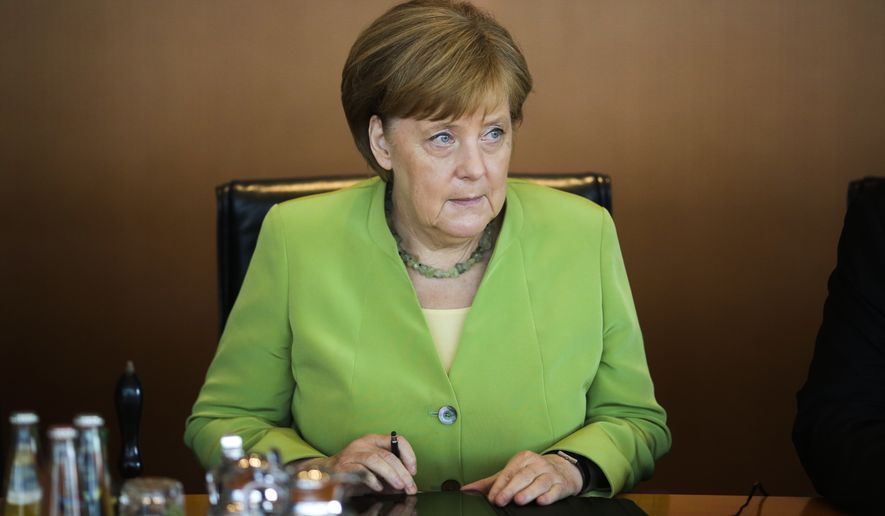
German Chancellor Angela Merkel attends the weekly cabinet meeting of the German government at the chancellery in Berlin, Wednesday, June 20, 2018. (AP Photo/Markus Schreiber)
BERLIN — German Chancellor Angela Merkel’s momentous decision three years ago to open her nation’s borders to refugees has come to define her political career. Now the policy is threatening to end it as biting internal politics over asylum increasingly surface.
The threat to Ms. Merkel’s approach is emanating from an unlikely source. Members of a key Bavaria-based conservative sister party to the chancellor’s Christian Democratic Union (CDU) are pressuring her to sharply draw down the open-borders policy.
In a push spearheaded by German Interior Minister Horst Seehofer and Bavarian Minister President Markus Soeder, the CDU-allied Christian Social Union has given Ms. Merkel a mandate to take action within two weeks.
If she fails to develop a plan with European Union partners to reform the bloc’s asylum policies by that time, Mr. Seehofer and Mr. Soeder say, they will take unilateral action and begin implementing a policy to turn away asylum-seekers at the German border.
Such a development is likely to deal a crushing blow to Ms. Merkel’s fragile centrist political coalition just three months after its inauguration.
Analysts say the situation could suddenly spell the end for Ms. Merkel, who is Europe’s longest-serving democratically elected leader, having held the chancellorship since 2005.
Pushing her out could recast the whole future of the EU at a moment when eastern members are increasingly hostile to bloc’s refugee policies.
“It would mean that the positions on the fringes of the European Union in Eastern and Central Europe to not accept any refugees will become stronger, which would be a potential end to German-led European policy and German-led refugee policy as we know it,” said Gero Neugebauer, a political scientist in Berlin.
“It’s like the domino theory in a way if the coalition falls apart: First one stone falls, then another and another,” Mr. Neugebauer said.
The Christian Social Union has been vehemently against the open-door refugee policy, which was implemented in a manner that effectively ignored EU regulations that require refugees to undergo the asylum process in the first country of their arrival.
Ms. Merkel’s decision to allow unrestricted travel for asylum-seekers brought more than 1 million newcomers to Germany, predominantly from the Middle East and North Africa, overwhelming German authorities and creating cultural and political backlash.
The policy won support from Ms. Merkel’s core base when it went into effect in 2015, as violent conflicts in Syria and Iraq were spawning a surge of refugees toward Europe. But it has rankled many Germans since.
Last year, the right-wing, anti-immigration Alternative for Germany, or AfD, entered German parliament for the first time with 12.6 percent of the vote. Support for the previously fringe party had effectively tripled since 2013, when the AfD failed to even enter parliament.
The party’s popularity has risen on the heels of a series of government blunders tied to the overall refugee situation. One was a December 2016 terrorist attack carried out by a migrant who many Germans believed should have been deported. Another came with the recent discovery that authorities had botched thousands of asylum applications in the city-state of Bremen.
In an attempt to counter the AfD’s rise, Ms. Merkel and her centrist government have walked back some aspects of the open-door refugee policy — most notably by increasing deportations, allowing only limited migration of refugees’ families and forming bilateral deals with outside partners such as Turkey in an attempt to halt the flow of migrants toward Germany.
Such actions have greatly decreased the number of arrivals, but Mr. Seehofer ramped up pressure in recent weeks to toughen German immigration policies further by beefing up border security and reinstating the European regulations mandating that refugees remain in the country where they are registered.
Ms. Merkel accepted the border moves but rejected the reinstatement of the EU policies. Instead, she has called for wider, international measures that would create a unified European asylum policy to replace country-by-country actions.
“I’m deeply convinced, whenever we talk about the dangers of the European Union, that it’s first and foremost about the foreign policy polyphony that we have and secondly that we still don’t have a common strategy to answer the question of mastering migration,” the chancellor said in a June 10 appearance on the German political talk show “Anne Will.”
“If Europe doesn’t accomplish that,” she said, “then Europe is in danger.”
But instead of getting in line with her, leaders of Ms. Merkel’s sister political party have dug in their heels. Mr. Seehofer, in particular, has bucked the chancellor. He said in an interview published Thursday by the German newspaper Passauer Neue Presse that if Ms. Merkel tries to stop his push for tighter immigration controls, he and his Christian Social Union allies will end their coalition with her.
“If you dismiss a minister who only cares about the safety and order of his country, that would be unprecedented,” Mr. Seehofer said. “I am chairman of the CSU, one of three parties in this coalition, and I act with full backing of my party. If the person in the chancellery is dissatisfied with the work of the federal minister of the interior, then she should end the coalition.”
The threat could force Ms. Merkel to curb her divisive refugee policies ahead of the Christian Social Union’s tough battle against the AfD in regional elections in Bavaria in October, said Olaf Boehnke, a senior adviser in Berlin with Rasmussen Global, a Brussels-based think tank.
“Seehofer is trying to kill two birds with one stone,” Mr. Boehnke said. “The CSU is under enormous pressure in Bavaria, and it’s in his own interest to say, ‘I’m the strong Bavarian guy in Berlin.’”
Ms. Merkel, a notorious behind-the-scenes and international political operator, is now seen to be scrambling to bring an EU-level migration deal to the fore. She has even agreed to French President Emmanuel Macron’s plan to erect a common eurozone budget, a move many saw as a concession to get Mr. Macron’s support for a revamped asylum policy at major migration summits this weekend and next at EU headquarters in Brussels.
But the prospects for such a revamped policy may be slim because Italy, Hungary, Poland and Austria are all now led by right-wing, anti-immigrant forces bent on bucking a Merkel-led bloc and stopping refugees at all costs.
Italian Prime Minister Giuseppe Conte clashed with Ms. Merkel on Wednesday as Italy signaled that it simply won’t agree to any new EU migration plan if the bloc doesn’t prioritize measures to assist Rome in dealing with its own surge of migrants. The Mediterranean nation is the leading point of arrival for refugees fleeing unrest in Libya by boat.
“[Ms. Merkel] is trying to practice the same magic and come to a compromise. She has to, or else she’ll lose all support,” said Mr. Boehnke. “It will be a hard task this time around. She has to acknowledge that the populists are very successful in stimulating this atmosphere that we have to urgently do something about migration.”
If Ms. Merkel isn’t able to stanch those forces and make progress, then the coalition ruling Germany will end, said Mr. Neugebauer. That would not only provide more footing for the AfD to gain ground by attacking Ms. Merkel and her political partners as incompetent, he said, but it also would lend weight to forces within the EU that have sought to dismantle the liberal, German-led status quo within the bloc.
“[It] would be a danger for the German democracy and everything that stands behind it if she’s not able to implement something,” Mr. Neugebauer said.
Source: https://www.washingtontimes.com/news/2018/jun/21/angela-merkels-open-borders-policy-could-spell-end/
[Disclaimer]






